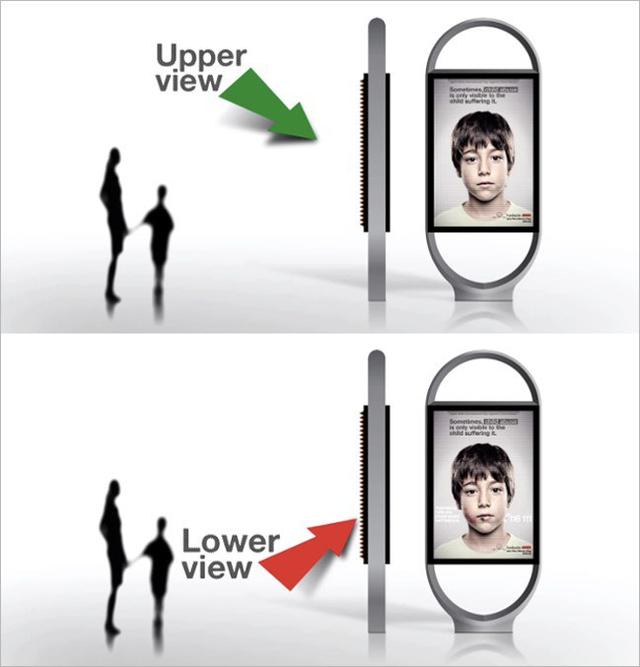Aid to Children and Adolescents at Risk Foundation ANAR: secret anti-abuse message
- Exhibited by
- Adil Husseini, Head of Fundraising & Marketing at Disasters Emergency Committee (DEC)
- Added
- June 23, 2016
- Medium of Communication
- Posters
- Target Audience
- Individuals, Children, Teenagers
- Type of Charity
- Children, youth & family, public society/benefit
- Country of Origin
- Spain
- Date of first appearance
- April, 2013
SOFII’s view
This is not strictly a fundraising idea but the clever use of lenticular printing is an inspiring use of poster advertising not only to target messages at vulnerable children but also to tackle social change.
Summary / objectives
To create awareness of a confidential helpline for victims of child abuse without the knowledge of their abusers (who are often their parents or guardians).
Background
When Spain's ANAR Foundation (Ayuda A Ninos Y Adolescentes En Riesgo, or Help For Children And Adolescents At Risk) decided to create an awareness campaign for its confidential hotline it had a big problem.
A parent or guardian usually accompanies a child everywhere he or she goes. And if the child is being abused it is often by a parent or guardian. So how do you tell that child that there is help out there for him – and get his attention – without letting the adult know?
You do it in secret.
It is said that two people can look at the same thing and see it differently. Which is the principle that ANAR employed with the clever use of lenticular printing in its campaign. This type of technology displays different images depending on what angle the viewer is looking at the print, meaning adults and children can look at the same image and receive different messages.
When adults view the ANAR’s poster campaign, they see a picture of a sad child and the words ‘sometimes, child abuse is only visible to the child suffering it’.
But when someone under four feet five inches (the average height of a 10 year old) looks at it, the visual is of a child with a bruised face with the text, ‘if somebody hurts you, phone us and we’ll help you’ along with the helpline number of ANAR.
The ad is designed to empower children, particularly if their abuser happens to be standing right next to them. Adults get an awareness message, children get an offer for help.
Results
There was a time that an outdoor poster campaign like this would be limited to the city it appeared in. But digital video allowed ANAR to share its unique message and shine a light on this worldwide issue. In its launch week the video received 7.7 million views and more than 37,000 Facebook shares.
Merits
The reason I find this campaign so compelling is because one medium is used to deliver two different messages but both have at the same time the same goal:
Protecting children and ending child abuse
- By innovating with technology to smartly reach its target audience.
- The ad cuts through with a concise and powerful message making interactivity immediate and not gimmicky.
- With clear tools for action provided.
- The metaphor embodied in the ad is very apt – the figurative differences in perception between the abuser and the abused here become uncomfortably literal.
- The ad holds another powerful message – that even if a child looks fine on the outside, there may still be a mental abuse or physical non-visible way, that only take place in the households.
- It’s a campaign that has a smart, compassionate strategy – seeking to help isolated and neglected children.
Creator / originator
Grey Spain and ANAR
This case study was presented at IWITOT London 2015.





















